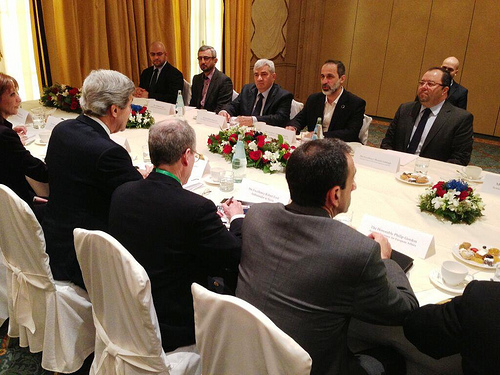
In March 2011, Syrian President Bashar al-Assad made a fateful and catastrophic choice. In Deraa, regime thugs had pulled the fingernails off of teenagers guilty of the high crime of spray-painting anti-regime graffiti. Instead of going there to console and compensate families, he ordered the same thugs to open fire on demonstrators.
With that decision, he signed his political death warrant — and perhaps that of Syria as well. What began in Deraa spread rapidly and (at first) peacefully. Now it consumes Syria entirely in a vicious and increasingly sectarian civil war.
 |
| Frederic C. Hof joined the Atlantic Council as a senior fellow with the Rafik Hariri Center for the Middle East in December 2012. Amb. Hof served as special advisor for transition in Syria for President Obama and as a deputy to George Marshall, US Department of State’s Special Envoy for Middle East Peace. |
Americans are now mourning the slaughter of innocents in Connecticut. Syrian children are terrorized, traumatized, injured, and killed daily. Americans wonder how to regulate the ownership of combat weaponry in the hands of private individuals. Syrians contemplate the horror of a regime that knows no limits in the methods it employs to stay in power, and an armed opposition no doubt tempted at times to mimic the behavior of those who do the unspeakable without regret or remorse.
What will be next? Chemical warheads mounted on Scud missiles launched in the general direction of rebel-held areas? Alawite villagers slaughtered by armed men seeking to avenge atrocities by a regime that has cynically and shamelessly put at risk the Alawite community?
In these circumstances, time is the enemy of humanity. The longer the regime has to break the Syrian people into combustible categories of sect and ethnicity, the greater the chance that Syria will become a stateless, chaotic and expanding black hole in a region where stability is a challenge in the best of circumstances. Lebanese, Turks and Jordanians already feel Syria’s agony — and share in it. Time, in this case, is not the great healer. Time is the deadliest of enemies.
Ideally Assad, the once and (if he is the luckiest man alive) future ophthalmologist, would seize one last chance to perform an act of human decency and real patriotism. He would designate a successor who doesn’t have blood on his hands, resign, and leave Syria, taking with him his immediate family, the politically active members of his clan, and those of his enablers who are not knee-deep in the crimes of his regime. His successor could then negotiate the composition of a transitional government with the recently internationally recognized Syrian Opposition Council. In this way the survival of the Syrian state could be secured and continuity of government preserved.
What are the chances of Assad acting humanely at long last? Probably zero. Most likely, he will be removed by force of arms. Yet the longer it takes, the worse for Syria and the neighborhood.
What can Syrians and the world do to prevent a nightmare scenario? First, the opposition should accelerate the excellent organizational progress it is making. The new Supreme Military Council — which pointedly excludes the loathsome jihadist group, Jabhat al-Nusra — must be hard-wired into the Syrian Opposition Council. The fragmentary nature of the armed opposition is, for all the headaches it causes, an admirable survival mechanism. Yet an armed movement operating without the benefit of clear political direction and a defined objective runs the risk of alienating the very people it is trying to defend.
Second, the council should transform itself into a provisional government — one ideally headed by ex-Prime Minister Riad al-Hijab, who is ideally positioned to lead an eventual national unity cabinet because of his familiarity with the Baath Party and the security services. That government should then install itself in northern Syria, where it would receive widespread international (including American) recognition as Syria’s legitimate government. Such recognition could be accorded in return for the government’s clear, unambiguous commitment to building a Syria where rule of law is respected, every citizen is granted equal rights, and authority is based on the consent of the governed.
Third, the United States and others should immediately establish security assistance relationships with this new government, providing arms and training. While Washington should simultaneously support the efforts of U.N.-Arab League envoy Lakhdar Brahimi to arrange a managed transition — one in which Assad and company would step aside voluntarily — it would be foolish to bet on the doctor’s willingness to do, at long last, the right thing.
Although the administration has so far resisted arming the opposition, arms are now the coin of the realm for anyone wishing to influence the course of Syria’s future. The United States and its allies — most notably Turkey — must dominate the logistics of external arms transfers, ensuring that weapons go to those advocating a non-sectarian, decent political system for Syria and are denied to those seeking a sectarian outcome.
Underlying all of these efforts should be systematic public and private outreach by the Syrian opposition and those supporting it to Syrian minorities. Millions of Syrians still tolerate the presence of the Assad regime, notwithstanding its incompetence, corruption and brutality. These regime’s failings are known to all — to the Alawite community, which remains Syria’s poorest and from which the Assad clan has seceded both socially and economically; and to the Christian community, which still sends many of its sons and daughters to the democracies of the world.
Yet these minority communities fear what may follow the devil they know. To date, the armed opposition has largely avoided replying in kind to the regime’s atrocities. Yet with al Qaeda in Iraq now operating in Syria under the guise of Jabhat al-Nusra, can it honestly be said that minority fears are ridiculous?
The negative reaction of the mainstream Syrian opposition to the U.S. designation of Jabhat al-Nusra as a terrorist organization is understandable. When you’re fighting for your life against a vicious, unprincipled enemy, you take help wherever it can be found. And while the timing of the designation was amateurishly lamentable — unnecesarrily neutralizing the impact of U.S. recognition of the Syrian Opposition Council — it still sent an important message to the minorities held hostage by Assad: No matter what happens, the United States will neither support nor tolerate the substitution of one form of tyranny for another in Syria.
If the mainstream opposition does not now understand the threat posed to Syria by Jabhat al-Nusra, it will learn the hard truth once the regime has fallen. In post-Assad Syria, the al Qaeda murderers embedded in the organization will not ride off into the sunset like Yul Brynner and the Magnificent Seven. They will want to stay to practice their bloody trade.
Syria’s suffering will likely continue. The departure of Assad will not be the end of the story. But the beginning of the end must entail an alternative to the regime, one enjoying the full support of the international community. And this alternative must make it clear to all Syrians that, in the new Syria, citizenship and citizenship alone will trump sect, ethnicity, gender, and all other categories used to divide the country. Time is the enemy. Time is of the essence. Time, for Syria and its neighbors, is running out.
Frederic C. Hof is a senior fellow of the Rafik Hariri Center for the Middle East at the Atlantic Council and the former Special Advisor for Transition in Syria at the US Department of State. This piece first appeared in Foreign Policy.
Photo by Freedom House
Image: syria_0.jpg
